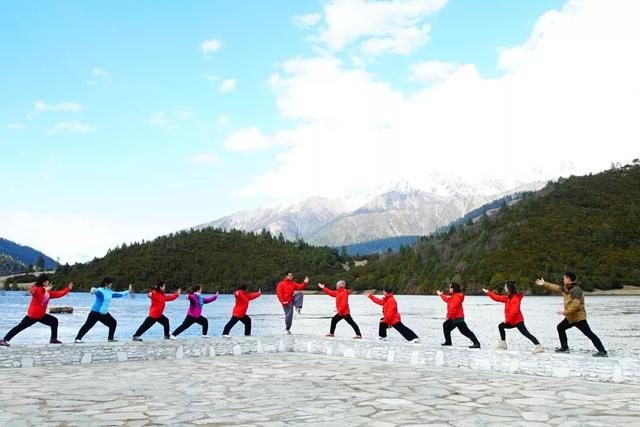臨床指南,科學文獻,患者信息:
聚焦一種形態:太極拳
老年人的跌倒預防
有證據表明,太極拳可以降低老年人跌倒的風險。還有一些證據表明,太極拳可以改善正常衰老和神經退行性疾病患者的平衡和穩定,包括輕度至中度帕金森病和中風。
證據基礎
功效
慢性疼痛
有證據表明,練太極拳可以幫助人們控制與膝關節骨性關節炎和纖維肌痛相關的慢性疼痛。
證據基礎
功效:膝關節骨性關節炎
功效:纖維肌痛
類風濕關節炎
有證據表明,太極拳可以改善類風濕性關節炎患者的下肢運動範圍。研究結果表明,太極拳不會加劇癥狀。目前尚不清楚太極拳能否改善與類風濕性關節炎或生活質量相關的疼痛。
證據基礎
功效
失眠
有一些有限的證據表明,太極拳可能是改善睡眠質量的有用的非藥物學方法。
證據基礎
功效
精神健康
一系列研究已經研究了運動與抑鬱之間的關係。較小的研究結果表明,運動也可能影響焦慮癥狀。更為確定的是太極拳對這些和其他心理因素的作用。
證據基礎
功效
認知功能
有證據表明,太極拳可能有潛力在沒有認知障礙的老年人中提供適度的認知功能增強。
證據基礎
功效
心血管健康
關於太極拳對心血管健康的有效性,只有有限的,不一致的證據。一些研究表明太極拳對心血管危險因素的有益作用,但大多數研究都很小,持續時間短,質量差,無法得出結論。
證據基礎
功效
安全
參考
是,DHHS國家補充和綜合健康中心的一項服務。NCCIH Clinical Digest是一份月度電子通訊,提供有關補充健康方法的循證信息,包括科學文獻檢索,NCCIH資助研究摘要,患者情況說明書等。國家補充和綜合健康中心致力於在嚴格的科學背景下探索互補的健康產品和實踐,培訓互補的健康研究人員,並向公眾和專業人員傳播權威信息。如需了解更多信息,請致電NCCIH的Clearinghouse免費電話1-888-644-6226,或訪問NCCIH網站nccih.nih.gov。NCCIH是美國國立衛生研究院的27個研究所和中心之一,該研究所是美國聯邦醫學研究的焦點。
版權內容屬於公共領域,可以重新列印,除非標記為受版權保護(?)。請將國家補充和綜合健康中心作為來源。所有受版權保護的資料均為其各自所有者的財產,未經其許可不得轉載。

Tai Chi: What the Science Says
August 2015
Clinical Guidelines, Scientific Literature, Info for Patients:
Spotlight on a Modality: Tai Chi
Fall Prevention in Older Adults
There is evidence that tai chi may reduce the risk of falling in older adults. There is also some evidence that tai chi may improve balance and stability with normal aging and in people with neuro-degenerative conditions, including mild-to-moderate Parkinson』s disease and stroke.
The Evidence Base
Efficacy
Chronic Pain
There is some evidence to suggest that practicing tai chi may help people manage chronic pain associated with knee osteoarthritis and fibromyalgia.
The Evidence Base
Efficacy: Knee Osteoarthritis
Efficacy: Fibromyalgia
Rheumatoid Arthritis
There is some evidence that tai chi may improve lower extremity range of motion in people with rheumatoid arthritis. Results of studies suggest that tai chi does not exacerbate symptoms. It is not known if tai chi improves pain associated with rheumatoid arthritis or quality of life.
The Evidence Base
Efficacy
Insom年
There is some limited evidence that suggests tai chi may be a useful nonpharmacologic approach to improve sleep quality.
The Evidence Base
Efficacy
Mental Health
A range of research has examined the relationship between exercise and depression. Results from a much smaller body of research suggest that exercise may also affect anxiety symptoms. Even less certain is the role of tai chi—for these and other psychological factors.
The Evidence Base
Efficacy
Cognitive Function
There is some evidence that suggests tai chi may have the potential to provide modest enhancements of cognitive function in older adults without cognitive impairment.
The Evidence Base
Efficacy
Cardiovascular Health
There is only limited, inconsistent evidence available on the effectiveness of tai chi for cardiovascular health. A few studies suggest beneficial effects of tai chi on cardiovascular risk factors, but most of the studies have been small, of short duration, and of poor quality to draw conclusions.
The Evidence Base
Efficacy
Safety
References
NCCIH Clinical Digest is a service of the National Center for Complementary and Integrative Health, NIH, DHHS. NCCIH Clinical Digest, a monthly e-newsletter, offers evidence-based information on complementary health approaches, including scientific literature searches, summaries of NCCIH-funded research, fact sheets for patients, and more.
The National Center for Complementary and Integrative Health is dedicated to exploring complementary health products and practices in the context of rigorous science, training complementary health researchers, and disseminating authoritative information to the public and professionals. For additional information, call NCCIH"s Clearinghouse toll-free at 1-888-644-6226, or visit the NCCIH Web site at nccih.nih.gov. NCCIH is 1 of 27 institutes and centers at the National Institutes of Health, the Federal focal point for medical research in the United States.
Copyright
Content is in the public domain and may be reprinted, except if marked as copyrighted (?). Please credit the National Center for Complementary and Integrative Health as the source. All copyrighted material is the property of its respective owners and may not be reprinted without their permission.
Subscriptions
NCCIH Clinical Digest is a monthly e-newsletter that offers evidence-based information on complementary and integrative health practices.









